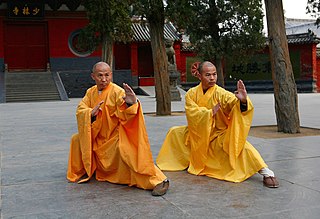
Taoism or Daoism is a diverse tradition indigenous to China, variously characterized as both a philosophy and a religion. Taoism emphasizes living in harmony with what is known as the Tao—generally understood as being the impersonal, enigmatic process of transformation ultimately underlying reality. The Tao is represented in Chinese by the character 道, which has several related meanings; possible English translations for it include 'way', 'road', and 'technique'. Symbols such as the bagua and taijitu are often employed to illustrate various aspects of the Tao, which can never be sufficiently described with words and metaphors alone. Taoist thought has informed the development of various practices and rituals within the Taoist tradition and beyond, including forms of meditation, astrology, qigong, feng shui, and internal alchemy. A common goal of Taoist practice is self-cultivation resulting in a deeper appreciation of the Tao, and thus a more harmonious existence.

Tom Clancy's Splinter Cell is a 2002 stealth game developed by Ubi Soft Montreal and published by Ubi Soft. It is the first game in the Splinter Cell series. Endorsed by author Tom Clancy, it follows the activities of NSA black ops agent Sam Fisher. The game was inspired by both the Metal Gear series and games created by Looking Glass Studios, and was built using Unreal Engine 2.

Northern Praying Mantis is a style of Chinese martial arts, sometimes called Shandong Praying Mantis after its province of origin. It was created by Wang Lang (王朗) and was named after the praying mantis, an insect, the aggressiveness of which inspired the style. One Mantis legend places the creation of the style during the Song dynasty when Wang Lang was supposedly one of 18 masters gathered by the Abbot Fu Ju (福居), a legendary persona of the historical Abbot Fu Yu, to improve Shaolin martial arts. However, most legends place Wang Lang in the late Ming dynasty.

Indiana Jones and the Emperor's Tomb is a 2003 action-adventure video game developed by The Collective and published by LucasArts for the Xbox, Microsoft Windows, PlayStation 2 and OS X. It features cover art by Drew Struzan. The game is an adventure of fictional archeologist Indiana Jones. The story takes place in 1935, acting as a prequel to Indiana Jones and the Temple of Doom. The tomb mentioned in the title is that of China's first Emperor Qin Shi Huang.

Jade Empire is an action role-playing game developed by BioWare, originally published by Microsoft Game Studios in 2005 as an Xbox exclusive. It was later ported to Microsoft Windows personal computers (PC) and published by 2K in 2007. Later ports to macOS (2008) and mobile platforms (2016) were handled respectively by TransGaming and Aspyr. Set in a world inspired by Chinese mythology, players control the last surviving Spirit Monk on a quest to save their tutor Master Li and defeat the forces of corrupt emperor Sun Hai. The Spirit Monk is guided through a linear narrative, completing quests and engaging in action-based combat. With morality-based dialogue choices during conversations, the player can impact both story and gameplay progression in various ways.

Fight Club is a fighting video game based on the 1999 film of the same name, which was based on the 1996 novel by Chuck Palahniuk. It was developed by Genuine Games and published by Vivendi Universal Games, and was released for the PlayStation 2 and Xbox systems on November 16, 2004 in North America and on December 10, 2004 in PAL regions.

Mortal Kombat: Special Forces is a 2000 action-adventure beat 'em up video game developed and published by Midway for the PlayStation in 2000. A spin-off of the Mortal Kombat franchise, it is the second installment to not be a fighting game and the first 3D spin-off. Set before the first game Mortal Kombat, players control Jax as he pursues criminal leader Kano and his gang.
John Tobias is an American comic book artist, graphic designer, video game designer and writer. Tobias is best known for creating the Mortal Kombat series along with Ed Boon, to whom he pitched the game concept.

Vietcong is a 2003 tactical first-person shooter video game developed by Pterodon in cooperation with Illusion Softworks and published by Gathering for Microsoft Windows. It is set during the Vietnam War in 1967.

Lei Wulong is a fictional character from the Tekken fighting game franchise created by Bandai Namco Entertainment. Added to the Tekken series as a tribute to Jackie Chan, Lei's role is that of a police officer who investigates the Mishima Zaibatsu corporation's illegal activities like hunting and trading of protected species. Lei has appeared in alternate Tekken media, as a playable character in Street Fighter X Tekken and many non-canon Tekken games, and critics have received the character positively.
Christopher P. Granner is a freelance music composer, best known for composing music for video games and pinball games.

Bruce Lee: Quest of the Dragon is a beat 'em up video game featuring martial artist Bruce Lee. It was developed by Ronin Entertainment and published by Universal Interactive, and was released in Europe and the United States for the Xbox in 2002 to a negative critical reception.

Lo Wei was a Hong Kong film director and film actor best known for launching the martial arts film careers of both Bruce Lee, in The Big Boss and Fist of Fury, and Jackie Chan, in New Fist of Fury.
Studio Gigante was a Chicago-based video game developer established in 2000 by John Tobias, Dave Michicich, and Joshua Tsui, several developers of Midway's popular Mortal Kombat fighting game series. Its name is a play on the name of the television series Sábado Gigante. The company only released two games, both exclusive to the original Xbox. Its first release was Tao Feng: Fist of the Lotus, which debuted in 2003 to mixed reviews. The company's sophomore effort, 2005's WWE WrestleMania 21 was critically panned. Other games included a Kill Bill prototype where players could play as the main character. Nevertheless, the game was never finished since they closed down before finding a potential publisher. The studio folded in 2005 shortly after the game's release.

Mortal Kombat is a media franchise centered on a series of fighting video games originally developed by Midway Games in 1992.

Taoist sexual practices are the ways Taoists may practice sexual activity. These practices are also known as "joining energy" or "the joining of the essences". Practitioners believe that by performing these sexual arts, one can stay in good health, and attain longevity or spiritual advancement.

Fighting Beauty Wulong is a Japanese manga series written and illustrated by Yūgo Ishikawa. It was serialized in Shogakukan's seinen manga magazine Weekly Young Sunday from August 2002 to May 2007, with its chapters collected in 18 tankōbon volumes and additional prequel gaiden volume. The series was adapted into a two-season of 25 episodes each, animated by TMS Entertainment and broadcast on TV Tokyo from October 2005 to October 2006.

Invincible Tiger: The Legend of Han Tao is a hand-to-hand action video game developed by Blitz Arcade and published by Namco Bandai Games for the PlayStation 3 and Xbox 360. The game tells the story of Han Tao, the General of a Thousand Victories, who attempts to rescue the Star of Destiny from the foul clutches of the Evil Overlord. As Han Tao, players must fight their way through the Evil Overlord's throngs, using a number of hyperbolic hand-to-hand combat techniques, ancient weapons, and Zen-powered attacks. It was released in 2009. The game was removed from all digital stores in 2013.

Baldur's Gate 3 is a role-playing video game developed and published by Larian Studios. It is the third main installment in the Baldur's Gate series, based on the tabletop role-playing system of Dungeons & Dragons. A partial version of the game was released in early access format for macOS, Windows, and Stadia on 6 October 2020. The game remained in early access until its full release on Windows on 3 August 2023. The PlayStation 5 version was released on 6 September 2023, with the macOS version released shortly thereafter on 22 September 2023. The Xbox Series X/S version is planned for release in late 2023. The game received critical acclaim for its narrative, gameplay, and player choice.
Feng "Franklin" Tao is a chemical engineer who was a Miller Associate Professor at the University of Kansas. His research areas of specialization are heterogeneous catalysis, energy chemistry, nanoscience and surface science. He has published over 180 papers in international journals.
















